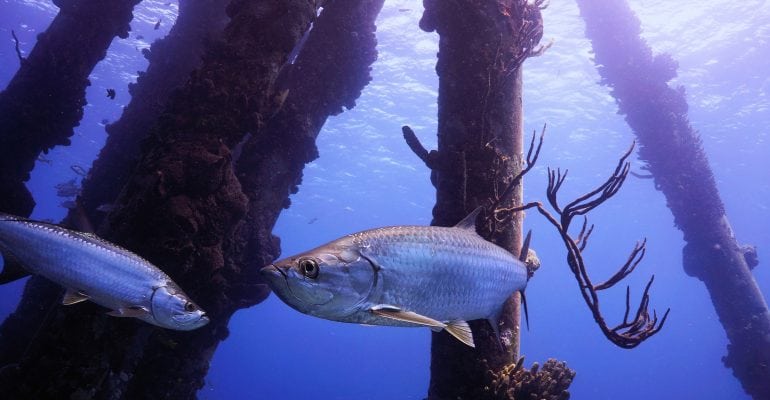Gov. John Bel Edwards and Louisiana Department of Wildlife and Fisheries (LDWF) Secretary Jack Montoucet have announced the LDWF’s Artificial Reef Program will help Louisiana anglers by preserving offshore fishing in the Gulf of Mexico where oil and gas platforms in less than 100 feet of water are being removed.
LDWF’s Artificial Reef Program (Reef Program) recently presented a master plan to the Louisiana Artificial Reef Development Council (Artificial Reef Council) that would preserve more of the platforms that remain and restore habitat that has been lost. With critical input of anglers and conservation partners, the Reef Program identified hundreds of potential artificial reef sites—both existing and lost platforms where anglers have been highly successful catching fish.
Platforms further offshore are prime fishing sites for red snapper, amberjack and grouper. Species such as spotted seatrout, sheepshead, and croaker are often found around platforms in shallower waters.
These platforms provide hard structure that is attractive to fish and otherwise not easy to find in the northern Gulf. But international law and federal regulation require their removal when production of oil and gas ends and the mineral lease expires.
The Reef Program accepts oil and gas platforms as artificial reefs, but it has been difficult to reef the platforms in less than 100 feet water, for technical and financial reasons.
The Reef Program established a quarter nautical mile development and buffer zone around each of the favorite sites to reduce potential impacts on shrimp trawling. The Reef Program staff, led by Artificial Reef Program head biologist Mike McDonough, also analyzed shrimp trawl effort data to ensure historical trawl activity within the zones was minimal.
The master plan and shrimp trawl analysis were presented to the Louisiana Shrimp Task Force for comments and suggestions. Suggestions were minimal and adjustments were made.
The potential artificial reef sites stretch from Cameron Parish to Plaquemines Parish, from three miles to 58 miles from shore, and will likely take many years to complete. However, the master plan is now in place and will serve as a guidance document for recreating and maintaining important fisheries habitat in shallow-water areas off the coast of Louisiana.
Louisiana Wildlife and Fisheries Commissioner Chad Courville and Rad Trascher from the Coastal Conservation Association (CCA) of Louisiana assisted in developing the plan. Their work soliciting favorite platforms from anglers helped ensure the master plan reflected angler preference while keeping impacts to other user groups at a minimum.
The Artificial Reef Program has already established several shallow-water reefs in the Gulf of Mexico, recently completing the South Marsh Island 233 West & East Reefs, also known as the Beaulieau Reefs, and Vermilion 119 & 124 Reefs, also known as the Rawls Reefs, in partnership with CCA Louisiana and St. Mary Parish-based DLS Energy. These reefs serve as initial steps in completing this plan with more projects to be developed in the future.
The Louisiana Department of Wildlife and Fisheries is charged with managing and protecting Louisiana’s abundant natural resources. For more information, visit us atwww.wlf.la.gov. To receive LDWF email alerts, signup at http://www.wlf.la.gov/signup.




